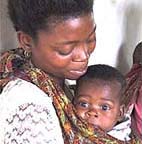|
||||

|
|
||||
|
Friday, 17 November 2000 PRESS RELEASE
CHILDREN’S VACCINE ADVOCATES TO MEET IN THE NETHERLANDS TO SHARE FIRST-YEAR SUCCESSES Recent U.S. contribution of $50 million supports ongoing efforts to immunize children
NOORDWIJK, the Netherlands—One year after the creation of the Global Alliance for Vaccines and Immunization (GAVI) and the Vaccine Fund, more than 300 individuals from public and private institutions and 40 developing country government health programs will gather next week in the Netherlands to take stock of their progress and plan expanded efforts in the coming years. Board meetings of both GAVI and the Vaccine Fund will also decide a second round of awards to developing countries for improved immunization services and/or the introduction of new vaccines. The existence of the Vaccine Fund has served to fill the gap in immunization funding for the 74 poorest countries of the world (those who have a GNP per capita of less than U.S.$1,000). The Vaccine Fund has raised nearly $1 billion toward its goal of $1.8 billion over the next five years to ensure that children in the world’s poorest countries are immunized. Earlier this month, the United States approved a $50 million contribution to the Vaccine Fund for its work. This follows earlier commitments from several European governments. "With this contribution, the U.S. Congress and President Clinton have acknowledged the importance of this new initiative and the tremendous need to do more to immunize the world’s children," said Jacques-François Martin, president of the Vaccine Fund for Children’s Vaccines. "We are gratified by the U.S. support and the momentum it provides to our efforts." In September, the Vaccine Fund awarded more that $150 million over five years to 13 countries in Africa, Asia and Latin America. Countries received support to strengthen basic immunization systems and to introduce newer, under-used vaccines such as hepatitis B and Haemophilus influenzae type b (Hib). A second round of awards will be announced in the Netherlands. Launched in November 1999, GAVI and the Vaccine Fund have accomplished much in their first year. Working together and with unprecedented commitment, the organizations involved in GAVI—the World Health Organization, UNICEF, the World Bank, national governments, private foundations, pharmaceutical companies and research institutions—are working together to immunize the world’s children. They claim that the collaboration has helped to streamline strategies, enabling stronger, smarter, and more efficient support to immunization programs in developing countries. The Global Alliance for Vaccines and Immunization (GAVI) is a coalition of organizations formed in 1999 in response to stagnating global immunization rates and widening disparities in vaccine access among industrialized and developing countries. The GAVI partners include: national governments, the Gates Children’s Vaccine Program at PATH, the International Federation of Pharmaceutical Manufacturers Associations (IFPMA), research and public health institutions, the Bill & Melinda Gates Foundation, the Rockefeller Foundation, the United Nations Children’s Fund (UNICEF), the World Bank Group and the World Health Organization (WHO). The Vaccine Fund, a new financing resource that was created in 1999, provides financial support directly to low-income countries to strengthen their immunization services and to purchase new and under-used vaccines. The Vaccine Fund received an initial $750 million grant from the Bill & Melinda Gates Foundation and has since received support from governments and other donors. In the future, Vaccine Fund resources may also be used to accelerate the development of vaccines for diseases responsible for significant mortality in developing countries, such as HIV/AIDS, tuberculosis, malaria, and acute respiratory diseases. While the Vaccine Fund has its own Board and management for fiduciary and fundraising responsibilities, decisions about programs to receive support will be made on the recommendation of GAVI.
|
||||
| Contact GAVI | Guestbook | Text version | Credits and Copyright | ||||
